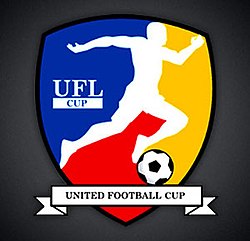United Football League Cup
 | |
| Founded | 2009 |
|---|---|
| Number of teams | 12 (2016) |
| Current champions | Global (2nd title) |
| Most successful club(s) | Philippine Air Force Global (2 titles) |
| Television broadcasters | AksyonTV Hyper |
| Website | UFL Cup |
The United Football League Cup, commonly known as UFL Cup, was a Filipino association football competition. It was played on a multistage format that culminated in a knockout stage (single elimination). Clubs eligible to compete for the cup were those who played in the United Football League. Likewise, it was open to all clubs in the Philippines that passed the requirements given by the Football Alliance Group, which organized the competition.[1][2] The UFL Cup run from mid-October to mid-December and was moved from May to August starting with the 2015 edition, to make it in line with the calendar of its Southeast Asian neighbors. It provided a chance for all clubs to play each other regardless of their league divisions.
The last holders of the UFL Cup were Global, who defeated Ceres 3–1 in the 2016 final for their second title.
History
The UFL Cup was first held in October 2009 where it was known as UFL–LBC Cup, after the name of LBC Express Inc. as its title sponsor and is sanctioned by the National Capital Region Football Association (NCRFA) and the Philippine Football Federation (PFF).[3] The purpose was to determine the distribution of clubs over the Divisions 1 and 2 of United Football League in its inaugural season. Clubs were divided into four groups of four, the top 2 finisher of each group after single round-robin elimination qualified for quarterfinals (for division one) and the bottom 2 battles for Plate Competition (for division two). Philippine Air Force was the inaugural cup champions by defeating Philippine Army 2–1.[4][5]
The 2011 UFL Cup season marks the first live television coverage of a match after AKTV (owned and operated by TV5) inked the historical 5-year multi-million peso deal with the UFL.[6]
Cup Winners And Runners-Up
| Club | Champions | Years won | Runners-up | Years lost |
|---|---|---|---|---|
| Philippine Air Force | 2 |
2009, 2011 | 1 |
2010 |
| Global | 2 |
2010, 2016 | 1 |
2012 |
| Loyola | 1 |
2013 | 1 |
2011 |
| Stallion | 1 |
2012 | 0 |
|
| Kaya | 1 |
2015 | 0 |
|
| Ceres | 0 |
2 |
2015, 2016 | |
| Philippine Army | 0 |
1 |
2009 | |
| Pachanga Diliman | 0 |
1 |
2013 |
Top goal scorers by edition
| Year | Scorer | Club | Goals |
|---|---|---|---|
| 2009 | Philippine Air Force | 8 | |
| 2010 | Global | 8 | |
| 2011 | Loyola | 25 | |
| 2012 | Loyola | 10 | |
| 2013 | Loyola | 21 | |
| 2015 | Kaya | 15 | |
| 2016 | Kaya | 11 |
Venues
Primary venues used in the 2012 UFL Cup:
| Manila | Taguig | Makati |
|---|---|---|
| Rizal Memorial Football Stadium | ASCom Football Field | University of Makati Stadium |
| Capacity: 12,873[7] | Capacity: 1,000[8] | Capacity: 4,000[9][10] |

|
||
| Santa Rosa, Laguna | Marikina | Parañaque |
| NUVALI FieldS #1 & #2, Nuvali | Marikina Sports Complex | Nomads Field |
| Capacity: N/A | Capacity: 30,000 | Capacity: 3,000[8] |
References
- ^ Olivares, Rick (August 7, 2011). "UFL Cup to kick off with smashing changes'". Business Mirror. Manila. Retrieved October 21, 2011.
- ^ de Guzman, Mikhail (July 14, 2011). "Calling All Clubs! The UFL Needs YOU!". Soccer Central Philippines. Retrieved October 22, 2011.
- ^ "Six matches kick off LBC-UFL Cup". The Philippine Star. October 17, 2009. Retrieved October 23, 2011.
- ^ Schöggl, Hans. "Philippines 2009/10". RSSSF. Retrieved October 19, 2011.
- ^ "Air Force Rider Crowned Champions of Inaugural UFL-LBC Cup". pfsa.cebufa.org. Retrieved October 21, 2011.
- ^ Olivares, Rick (September 16, 2011). "AKTV, UFL ink historic five-year deal". interaksyon.com. AKTV. Archived from the original on September 25, 2011. Retrieved December 10, 2011.
- ^ Leyba, Olmin (June 21, 2011). "Rizal can only seat 13,000". The Philippine Star. Archived from the original on September 9, 2012. Retrieved November 4, 2011.
- ^ a b "Stadiums in the Philippines". WorldStadiums.com. Retrieved November 4, 2011.
- ^ "University of Makati Stadium". sports.opera.com. Retrieved November 4, 2011.
- ^ "University of Makati Stadium". soccerway.com. Retrieved November 4, 2011.
External links
- Official website
- United Football League Philippines at Facebook.com
- United Football League Philippines at Twitter.com
